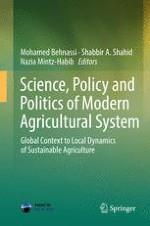
2014 | OriginalPaper | Buchkapitel
1. Agricultural and Food System—Global Change Nexus: Dynamics and Policy Implications
verfasst von : Mohamed Behnassi, Shabbir A. Shahid, R. Gopichandran
Erschienen in: Science, Policy and Politics of Modern Agricultural System
Verlag: Springer Netherlands
Aktivieren Sie unsere intelligente Suche, um passende Fachinhalte oder Patente zu finden.
Wählen Sie Textabschnitte aus um mit Künstlicher Intelligenz passenden Patente zu finden. powered by
Markieren Sie Textabschnitte, um KI-gestützt weitere passende Inhalte zu finden. powered by